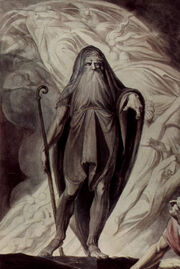Chapter Summary[]
The chapter is, simply, about sexual intercourse. The title of this chapter, The Fire Sermon, is a sermon given by Buddha. In this sermon, he encourages people to stay away from earthly passion – free themselves

The Fire Sermon
from the fire of lust. This is a rather ironic reference that Eliot made because in this chapter, that is exactly opposite of what people do – they cannot resist lust or earthly passion. In the first stanza, Eliot gave description of the Wasteland, a place with brown land, wet bank, and no humanity. He did this by taking away symbolisms of water, which is hold as a valuable treasure to many religions and cultures. He also criticized the manner and behavior people treating each other: jealousy, anger and sexual desire.

Tiresias appears to Odysseus during the nekyia of Odyssey xi, in this watercolor with tempera by the Anglo-Swiss Johann Heinrich Füssli, c. 1780-85
Eliot, in the voice of Tiresias, telling his view on relationships among the society these days. He, in the shoe of Tiresias, a blind prophet but has seen it all. He was forced to watch all those empty relationships between humankind. To Eliot, sex is dirty, a sin that all humankind is covered with, a sin that will make us all go to hell. But the Tiresias has both perspectives; men and women because he was turned into a woman for seven years. In another point of view, women are not always the turned sex into an emotionless motion between two lives. Like the relationship between the female typist and her house’s agent clerk. Sex happens between them just like a costumer with a prostitute. The guy satisfies his desire on the female typist body while she feels tasteless, and she’s actually glad that it was over. So the whole part is just saying that love is no longer love, but just plain sexual desire.
With a quotation from William Shakespeare’s The Tempest, the reader is transported back into the City of London. Here the reader visits a fishmen’s bar, the interior of St. Magnus- the- Martyr, then back to the Thames. The Thames-daughters from Spencer’s poem sings a nonsense chorus, and the scene shifts to Queen Elizabeth I and the Earl of Leicester, and the queen is unmoved by her lover’s declarations, and think of her people. At the end there is a reference to St. Augustine’s Confession and a simple allusion to Buddhist Fire Sermon.
Form of the Chapter
| The river’s tent is broken: the last fingers of leaf | |
| Clutch and sink into the wet bank. The wind | |
| Crosses the brown land, unheard. The nymphs are departed . | 175 |
| Sweet Thames, run softly, till I end my song . | |
| The river bears no empty bottles, sandwich papers, | |
| Silk handkerchiefs, cardboard boxes, cigarette ends | |
| Or other testimony of summer nights. The nymphs are departed. | |
| And their friends, the loitering heirs of city directors; | 180 |
| Departed, have left no addresses. | |
| By the waters of Leman I sat down and wept… | |
| Sweet Thames, run softly till I end my song, | |
| Sweet Thames, run softly, for I speak not loud or long. | |
| But at my back in a cold blast I hear | 185 |
| The rattle of the bones, and chuckle spread from ear to ear. | |
| A rat crept softly through the vegetation | |
| Dragging its slimy belly on the bank | |
| While I was fishing in the dull canal | |
| On a winter evening round behind the gashouse. | 190 |
| Musing upon the king my brother’s wreck | |
| And on the king my father’s death before him. | |
| White bodies naked on the low damp ground | |
| And bones cast in a little low dry garret, | |
| Rattled by the rat’s foot only, year to year. | 195 |
| But at my back from time to time I hear | |
| The sound of horns and motors, which shall bring | |
| Sweeney to Mrs. Porter in the spring . | |
| O the moon shone bright on Mrs. Porter | |
| And on her daughter | 200 |
| They wash their feet in soda water | |
| Et, O ces voix d’enfants, chantant dans la coupole! | |
| Twit twit twit | |
| Jug jug jug jug jug jug | |
| So rudely forc’d. | 205 |
| Tereu | |
| Unreal City | |
| Under the brown fog of a winter noon | |
| Mr Eugenides , the Smyrna merchant | |
| Unshaven, with a pocket full of currants | 210 |
| C. i. f. London: documents at sight, | |
| Asked me in demotic French | |
| To luncheon at the Cannon Street Hotel | |
| Followed by a week-end at the Metropole. | |
| At the violet hour , when the eyes and back | 215 |
| Turn upward from the desk, when the human engine waits | |
| Like a taxi throbbing waiting, | |
| I Tiresias , though blind, throbbing between two lives, | |
| Old man with wrinkled female breasts, can see | |
| At the violet hour, the evening hour that strives | 220 |
| Homeward, and brings the sailor home from sea, | |
| The typist home at tea-time, clears her breakfast, lights | |
| Her stove, and lays out food in tins. | |
| Out of the window perilously spread | |
| Her drying combinations touched by the sun’s last rays, | 225 |
| On the divan are piled (at night her bed) | |
| Stockings, slippers, camisoles, and stays. | |
| I Tiresias, old man with wrinkled dugs | |
| Perceived the scene, and foretold the rest— | |
| I too awaited the expected guest. | 230 |
| He, the young man carbuncular, arrives, | |
| A small house-agent’s clerk, with one bold stare, | |
| One of the low on whom assurance sits | |
| As a silk hat on a Bradford millionaire. | |
| The time is now propitious, as he guesses, | 235 |
| The meal is ended, she is bored and tired, | |
| Endeavours to engage her in caresses | |
| Which still are unreproved, if undesired. | |
| Flushed and decided, he assaults at once; | |
| Exploring hands encounter no defence; | 240 |
| His vanity requires no response, | |
| And makes a welcome of indifference. | |
| (And I Tiresias have foresuffered all | |
| Enacted on this same divan or bed; | |
| I who have sat by Thebes below the wall | 245 |
| And walked among the lowest of the dead.) | |
| Bestows one final patronizing kiss , | |
| And gropes his way, finding the stairs unlit… | |
| She turns and looks a moment in the glass, | |
| Hardly aware of her departed lover; | 250 |
| Her brain allows one half-formed thought to pass: | |
| “Well now that’s done: and I’m glad it’s over.” | |
| When lovely woman stoops to folly and | |
| Paces about her room again, alone, | |
| She smoothes her hair with automatic hand, | 255 |
| And puts a record on the gramophone. | |
| “This music crept by me upon the waters” | |
| And along the Strand , up Queen Victoria Street. | |
| O City City, I can sometimes hear | |
| Beside a public bar in Lower Thames Street, | 260 |
| The pleasant whining of a mandoline | |
| And a clatter and a chatter from within | |
| Where fishmen lounge at noon: where the walls | |
| Of Magnus Martyr hold | |
| Inexplicable splendour of Ionian white and gold. | 265 |
| The river sweats | |
| Oil and tar | |
| The barges drift | |
| With the turning tide | |
| Red sails | 270 |
| Wide | |
| To leeward, swing on the heavy spar. | |
| The barges wash | |
| Drifting logs | |
| DownGreenwich reach | 275 |
| Past theIsle of Dogs. | |
| Weialala leia | |
| Wallala leialala | |
| Elizabeth and Leicester | |
| Beating oars | 280 |
| The stern was formed | |
| A gilded shell | |
| Red and gold | |
| The brisk swell | |
| Rippled both shores | 285 |
| South-west wind | |
| Carried down stream | |
| The peal of bells | |
| White towers | |
| Weialala leia | 290 |
| Wallala leialala | |
| “Trams and dusty trees. | |
| Highbury bore me. Richmond and Kew | |
| Undid me. By Richmond I raised my knees | |
| Supine on the floor of a narrow canoe.“ | 295 |
| “My feet are at Moorgate , and my heart | |
| Under my feet. After the event | |
| He wept. He promised ‘a new start.’ | |
| I made no comment. What should I resent?” | |
| “On Margate Sands. | 300 |
| I can connect | |
| Nothing with nothing. | |
| The broken finger-nails of dirty hands. | |
| My people humble people who expect | |
| Nothing.” | 305 |
| la la | |
| To Carthage then I came | |
| Burning burning burning burning | |
| O Lord Thou pluckest me out | |
| O Lord Thou pluckest | 310 |
| burning |